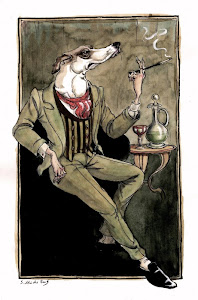From the publisher:
'A colourful and fascinating history of our favourite spirit told through the life and times of our capital city.
Gin Glorious Gin is a vibrant cultural history of London seen through the prism of its most iconic drink. Leading the reader through the underbelly of the Georgian city via the Gin Craze, detouring through the Empire (with a G&T in hand), to the emergence of cocktail bars in the West End, the story is brought right up to date with the resurgence of class in a glass - the Ginnaissance.
As gin has crossed paths with Londoners of all classes and professions over the past three hundred years it has become shorthand for metropolitan glamour and alcoholic squalor in equal measure. In and out of both legality and popularity, gin is a drink that has seen it all.
Gin Glorious Gin is quirky, informative, full of famous faces - from Dickens to Churchill, Hogarth to Dr Johnson - and introduces many previously unknown Londoners, hidden from history, who have shaped the city and its signature drink.'
06 September 2014
Subscribe to:
Post Comments (Atom)






















3 comments:
I can not drink any longer. However, back in day gin was a favorite libation. Yesrs ago I read something interesting about gin from The Big Damn Book of Manliness. Gin was originally created as part of medical research experiment. Physicians wanted to find out if alcohol had any medicinal benefits. Pure alcohol was flavored with juniper and given out in heaping amounts to run the experiment. They found the medical benefits were little. However, they did discover a cheap intoxicant to sell the peasants as an alternative to wine. I guess gin and its drinkers are more refined now. After a tour with bourbon then scotch I moved to gin. I drank 2 liters a day for about 4 years. It made me the man I am today.
Jenever was introduced to Britain by the illegitimate usurper of the throne William of Orange in 1688. It quickly became the scourge of the hoi polloi and made London an even more depraved and hideous population sink than it already was. It only developed a certain cachet when it was widely adopted by middle-class British colonial functionaries assigned to fetid disease ridden outposts in order to mask the even worse taste of the quinine they took to ward off the symptoms of the malarial infections they all suffered from.
It remains a drink of the lower orders who are looking for a cheap drunk or striving middle class twats who are trying to ape other Anglophile middle class twats who think that English colonial bureaucrats are some sort of paradigm of proper behavior.
Folks of discerning taste and cultural refinement drink properly aged cognac and whiskies when imbibing spirits. Unlike gin, these liquids do not taste like gasoline.
I apologize for the typographical errors above. I should have had my glasses on. That comments box is really small, and I promise I was not in the cup.
Post a Comment